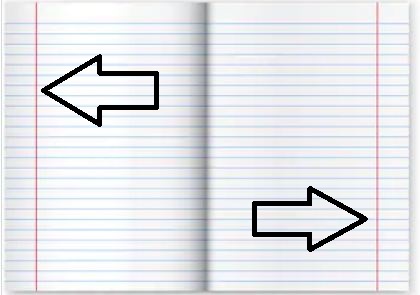Also, it is less taxing to read a paper in which margins have been observed because there is some white space. When I was teaching, that space to the left of the page came in handy for making comments on the student’s essay and for recording the grade. I liked the faint blue horizontal lines as well, which prevented the students from cramming too many lines of writing on one page as well as forcing them to write in continuous straight lines.
Angela Watson is right about the value of the space in teaching. And in writing e-books, I also find the publisher wants me to leave plenty of space in a manuscript by using greater line spacing, more space between paragraphs, and by breaking up the pages of solid type by periodically inserting quotes throughout the manuscript.
I also agree with the author of Fewer Things, Better, when she says we need more space in our lives. Trying to do too much, scheduling too tightly, and jumping directly from one task to another throughout the day is counterproductive, induces stress, and encourages errors. We must add space by allowing extra time for each task to accommodate those inevitable interruptions that occur. We also must schedule time, not just for work, but for regular breaks to recharge our energy supply and maintain a clear mind.
We must also apply margins in the form of specific quitting times, so we do not let our work run into our personal life. Also, we need margins on lengthy tasks or projects, so we do not exhaust our mental energy by working most of the day on the same project. We accomplish more by working in chunks of time. You would not attempt to write a book in one day for instance, so neither should you attempt a three-hour task at one sitting. I find that 90 minutes is the maximum time I can work on the same task without a significant drop in productivity.
We need margins in our personal lives as well, so we should go to bed and get up at consistent times, so we get a minimum of about 7 hours of sleep each night. Also, margins for the time spent watching TV, participating in social media, and so on. Everyone needs space and margins in their life to maintain health, productivity, and balance.
Having said all that, research confirmed that the original reason for the margin along the side of notebooks and notepaper was not to guide the writer or facilitate its use for teachers. It seems that the first books were victimized by mice, rats, and other rodents who nibbled away at the edges of the pages, sometimes devouring words in the process. So, to keep the words from being destroyed, the practice of leaving margins began. At least that way the mice would have to eat their own words if they were hungry.
And even here is an analogy you could use. Do not let others nibble away at your time with interruptions. Add margins by scheduling blocks of time, perhaps 90 minutes or less, to work on your priority tasks. These “appointments with yourself” are times you are unavailable to others, which of course requires your smartphone to be off or on airplane mode, and your working space as inaccessible as possible to others during that time.
And if you are a teacher, you cannot pick up a better book to explain how to manage your time than Angela Watson’s Fewer Things, Better. Helpful books like this one are few and far between.
Successful People Read. A Lot.
What do Warren Buffett, Mark Zuckerberg, Elon Musk and Oprah Winfrey have in common? They all read - a LOT! If you want to be successful you need to read. We have over 30 short ebooks designed to get you booked up fast!


